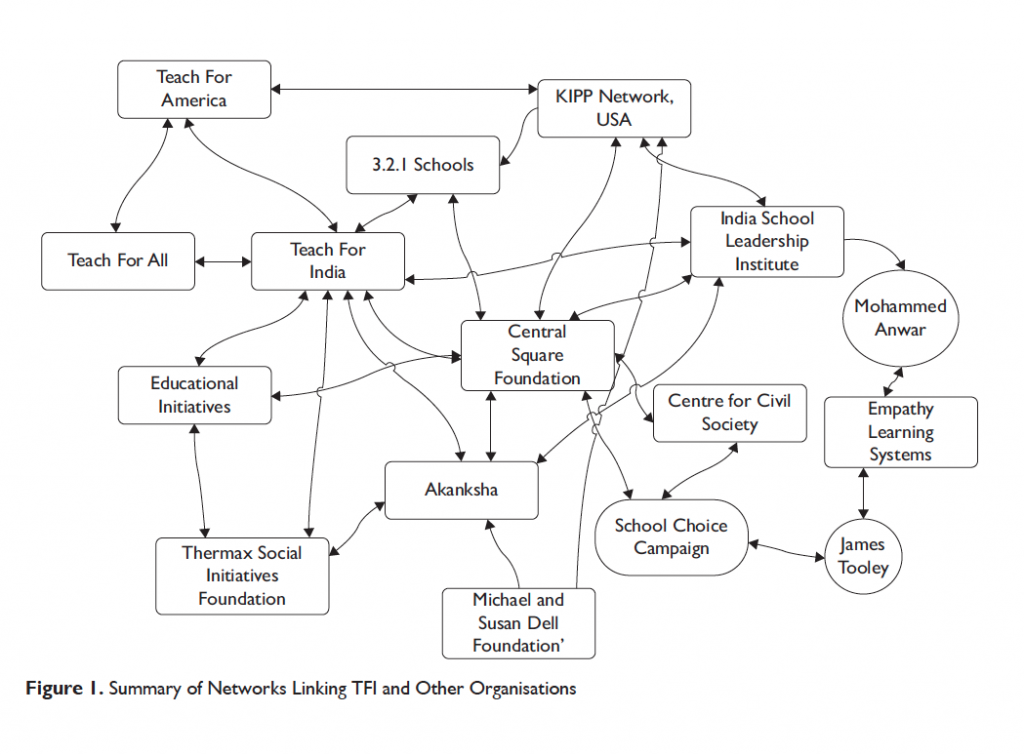“Hallelujah The Saviors are Here”
Rachel Smith (2012)
[We] only see them for two years,
because we are a stepping stone to their prep schools,
where they can share their experience about the inner city blues.
All their stories start out with, ‘Oh, in the ghetto…’
As their colleagues prepare to hear about
the students on an educational death roll.
It is time we rebuked these self-proclaimed saviors
and put our faith in the true educators,
the ones that expect master’s degrees and double majors
and not just the ones trying to do the black community a couple of favors.
Vivek Vellanki, who works with the Regional Resource Centre for Elementary Education at University of Delhi and is a former Teach for India Fellow, has written a very intriguing analysis of TFI/Teach for All, published in the journal Contemporary Education Dialogue:
Vellanki, V. (2014). Teach for India and education reforms: Some preliminary reflections. Contemporary Education Dialogues, 11(1), 137-147.DOI: 10.1177/0973184913509759
An excerpt of Rachel Smith’s powerful poem opens the article and this gives you a sense of where Vellanki is headed with this analysis, which focuses on two issues.
First, he examines “the teacher preparation programme adopted by TFI, highlighting the influence of the Western counterparts and the disjuncture that this creates with local contexts, policy initiatives and curricular frameworks.” You won’t be surprised to find the program is judged inadequate. And, in terms of the fledging Teach for Canada, which apparently is now focusing on First Nations education and schools in the northern territories (as opposed to TFA’s focus on urban schools in the USA), Vellanki’s critique of TFI’s colonialist approach is crucially important and applies, albeit in differing ways to Teach for America, as Rachel Smith makes clear, and for Teach for Canada.
[Heather McGregor has made similar points about Teach for Canada: “What does History have to do with ‘Teach For Canada’? Sustainable Improvement in Rural and Northern Teaching”. See additional analyses of Teacher for Canada by Tobey Steeves at Remapping Education.]
Secondly, Vellanki unravels the advocacy networks within which these programs (TFI/TFA) locate themselves, and examines at the education reform agenda they are pursuing, both locally and globally, which are, if you know anything about TFA, based upon neoliberal capitalist tenets (e.g., so-called public private partnership models aimed at privatizing public education or at least extracting private profits from funding for public education).
Vellanki’s network analysis illustrates how TFI/TFA develops policy clout. And as he notes “TFA and some of its alumni have been linked to the spread of the charter school movement, test-based teacher evaluation, privatisation and the insidious laying off of veteran teachers.”
Vellanki’s work on the TFI/TFA network is illuminating and echoes similar analyses of corporate and philanthropic connections that are shaping education reform in North America (see, for example, the work of Kenneth Saltman).

 Follow
Follow
